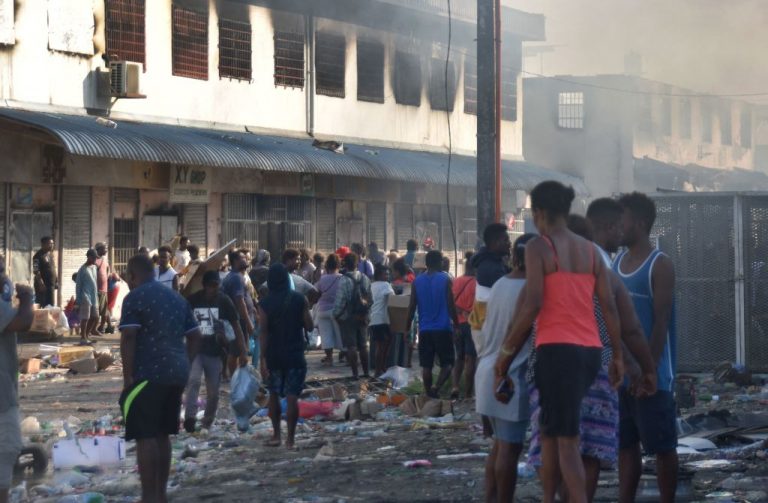The Solomon Islands, a country in the southwestern Pacific Ocean home to roughly 680,000 people, has faced civil unrest in recent months. Violent protests broke out in late November after Prime Minister Manasseh Sogavare was accused of taking money from a national development fund with ties to the Chinese regime. Sogavare has rejected allegations of corruption and blamed the riots on “a few evil people” who want him removed from office.
1. China-Solomon relations
China and the Solomon Islands established official bilateral relations in 2019 when the Solomons switched its allegiance from Taiwan in favor of Beijing. The People’s Republic of China (PRC) has requested that under its “One-China principle,” all countries wishing to form diplomatic relations with it must first terminate official ties with Taiwan.
Chinese foreign ministry spokesman Zhao Lijian said on Dec. 23 during a daily press briefing that “equipment and personnel were offered at Solomons’ request and would “soon arrive” to enhance the ability of its police.”
“China firmly supports the government of Solomon Islands in defending the country’s stability and resolutely safeguards the relations between China and Solomon Islands,” Zhao added.
While China said it was asked by the Solomons to send help, a statement by the Solomon Island government said it was accepting China’s offer to help strengthen its police force.
Success
You are now signed up for our newsletter
Success
Check your email to complete sign up
The government of Solomon said it had accepted China’s offer of riot equipment and six police liaison officers to equip and train its police force “with the skill sets complimenting ongoing training received under existing bilateral assistance.”
According to the statement, the Chinese government will also be sending shields, helmets, batons and other non-lethal gear “that will further enhance Solomon Islands police ability in confronting future threats.”
2. Locals angry about unfair deals
The riots in the Solomons have highlighted how Pacific nations are reacting to Beijing’s efforts in poaching the few remaining diplomatic allies of Taiwan, a self-ruled island the Chinese Communist Party (CCP) sees as a breakaway province.
READ MORE:
Nicaragua Ends Diplomatic Relations With Taiwan, Recognizes Beijing Under ‘One-China’ Policy
In the protests that broke out on Nov. 24, dozens of buildings and shops were burned and looted in the Chinatown neighborhood of Honiara, the Solomons’ capital.
The opposition forces in the island have accused Sogavare of embezzling money from the country’s National Development Fund which has been backed by Beijing since the diplomatic switch took place under Sogavare in 2019.
Sogavare has blamed foreign powers that opposed his 2019 decision to switch diplomatic recognition from Taipei to Beijing for influencing anti-government protesters, including “Taipei agents” from the Malaita province.
Observers attribute the violent protests to a combination of factors, including lingering resentment over Beijing’s influence in local politics and the economy — particularly in the Malaita province — discontent over corruption, rising poverty, unemployment and informal settlements.
3. Australia and other countries are sending police to control the unrest
Following November’s riots, Australian Prime Minister Scott Morrison said his country would “take no part in internal issues of the Solomon Islands.” However, it still deployed a special forces team to assist the island in restoring order.
Australia’s police-led deployment to the Solomons has been gradually reduced, but 40 Australian Federal Police members, 15 Australian Defense Force personnel and three Department of Foreign Affairs and Trade (DFAT) staff continue to remain there.
To counter China’s expanding activity in the Asia-Pacific, Australia has also ramped up its presence in the Pacific via its membership in the “Quad” group. Also joining this initiative are the United States, India and Japan.
“Australia, together with our Pacific family partners Fiji, Papua New Guinea and New Zealand, responded swiftly and effectively to the 25 November request from Solomon Islands government to help Royal Solomon Islands Police Force (RSIPF) restore calm in Honiara following civil unrest,” a spokesperson for the DFAT said.
The DFAT also said it was aware of the Chinese government’s expected engagement to assist the Solomons and added that “since that time, Australia and the Pacific family partners have successfully supported Solomon Island police in maintaining a stable and calm situation.”
The Australian government has yet to directly comment on the Solomon Islands’ decision to accept assistance from Chinese forces.
















